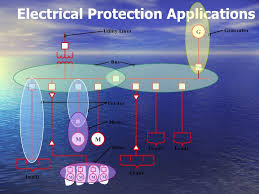Introduction
Electrical protection devices are a fundamental and critical aspect of electrical installations. Protection is applied on a component basis. Relays are associated with each major component of the power distribution system to detect various forms of distress associated with those components. If one of those relays operates, which means that an output contact protective devices which then isolates the defective system components. It may be convenient to think of the circuit breaker as the muscle that does the work of isolating the component, while the relay is the brain which decides that isolation is required.
The seminar will highlight:
- Operational principles and types of electrical protection
- Design of different types or relays
- Protection coordination and architecture
- Protection for feeders, motors and transformers
- Short circuit current calculations
Objectives
At the end of the seminar you will learn to:
- Appreciate the practical solutions for specifying the correct type of electrical protection
- Understand comprehensive understanding of principles and selection of relays
- Develop design of protection schemes
- Learn the construction and functions of instrument transformers
- Explain types grounding system and earthing fault protection
Training Methodology
Each course participant will receive a copy of the comprehensive course The course is designed to have an interactive format to maximize delegate participation. Questions and answers are encouraged throughout and at the daily sessions. The presenter will discuss specific problems and appropriate solutions. Only minimum note-taking is encouraged to ensure maximum delegate attention during the course.
Organizational Impact
The seminar provides an ideal way to cater for technical training of personnel. The benefits for the organisation can be summarised as follows:
- Technical training and up-skilling to improve and realise the full potential of a competent workforce
- Productivity increase through minimisation of project time acceptance/design and commissioning
- Identification for opportunities of improvements due to deep understanding of the presented state-of-the-art technologies
- Networking of personnel with technology leaders and other engineers and technicians with strong field experience
- Exposure of personnel to the standard international procedures
- Attitude change of workforce, as continuous follow up of new technologies and their up taking could otherwise create workforce with high resistance to change due to lack of understanding
Personal Impact
On successful completion of this course delegates will be able to:
- To understand the types and reasons of electrical faults
- To understand the various types of electrical protection devices in an LV and MV electrical system namely fuses, circuit breakers and protection relays
- To understand the operations and types of protection relays namely the micro logic, solid state and numerical relays
- To install and select the correct type of relays for specific functions
- Common protection relays for switchboards, feeders, motors and transformers
- Types of short circuit currents impact and calculations
Who Should Attend?
Electrical protection is a very important component in all electrical installations. It is imperative that all personnel associated with electrical installation operations and maintenance need to understand the concepts of electrical protection.
This course is suitable to a wide range of professionals but will greatly benefit:
- Engineers and Technicians from electricity supply industry
- Technical Management Professionals and Department Leaders
- Engineering Professionals from companies manufacturing and operating power and distribution transformers
- Engineers and Technical Personnel in power utilities, petrochemical plants, service professionals of large infrastructure projects
- Maintenance and operations technicians
SEMINAR OUTLINE
DAY 1
Types of Electrical Protection Devices and Faults
Introduction to the different types of electrical protection devices. Operation of electronic releases in relation with the time, current curves.
Key behaviors:
- Understand the principles of electrical protection
- Explain the characteristics of the time current curves
- Determine the protection coordination
- Design an LV switchboard protection system
- Be able to determine the fault currents
Topics to be covered:
- Protection and control devices
- Types of electrical faults
- Characteristics of fuses for electrical protection
- Characteristics of circuit breakers for electrical protection
- Functions of electronic releases
- Time, current and trip curves
- Protection coordination
- LV switchboard protection against short circuit
DAY 2
Protection Functions and Instrument Transformers
Key behaviors:
- Understanding power system architecture
- Determine power system protection
- Explain the functions of instrument transformers
- Learn the different types of relays
- Design a simple numerical relay application for protection
Topics to be covered:
- Power system architecture
- Protection functions
- Discrimination
- Power system protection
- Sensors
- Current and voltage transformers
- Types of relays
- Numerical relays and functions
DAY 3
Busbar, Transformer and Motor Protection Systems
Key behaviors:
- Explain busbar protection system
- Determine transformer protection system
- Understand motor protection system
- Design setting for protection systems
- Be able to differentiate the various protection functions
Topics to be covered:
- Busbar protection
- Transformer protection
- Motor protection
- Capacitor protection
- Type of related faults
- Relevant protection functions
- Recommended settings
- Applications examples
DAY 4
Grounding Systems and Earth Fault Protection
Key behaviors:
- Understand methods of grounding
- Application of unit protection system
- Analyse distance protection system
- Explain protection against over voltage
- Design system integrity protection schemes
Topics to be covered:
- Overcurrent protection for phase and earth faults
- Unit protection schemes
- Distance protection
- System integrity protection schemes
- Protection of feeders against overload and short circuit
- Types of grounding system
- Earthing protection systems
- Protection against over voltages
DAY 5
Methods of Calculating Short Circuit Current and Harmonics
Key behaviors:
- Understand short circuit calculations
- Analyse electrical fault topologies
- Explain positive, negative and zero sequence
- Determine causes of harmonics
- Develop harmonics mitigation methods
Topics to be covered:
- Calculation of short circuit current
- Fault topologies
- Short circuit current at fault point
- Positive, negative and zero sequence systems
- Harmonics effects
- Harmonics mitigation techniques
- Wrap up session
- Q&A session

